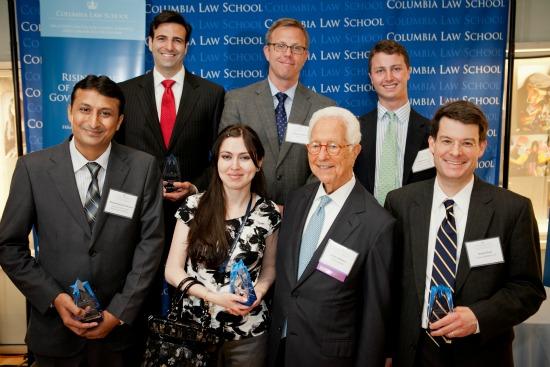Millstein Center Hosts Wide-Ranging Discussion of Global Markets in Forum at Columbia Law School
Two-Day Event Draws Hundreds of Leading Corporate Governance Experts to Analyze the Challenges and Transformations Occurring in the Global Capital Markets
New York, July 26, 2013—The Ira M. Millstein Center for Global Markets and Corporate Ownership recently hosted the 8th annual Millstein Governance Forum at its new home, Columbia Law School. The 2013 Forum, sponsored by Deloitte; IRRC Institute; CFA Institute; Weil, Gotshal & Manges; and Broadridge, brought together more than 200 prominent academics and practitioners in the fields of investment, business, and law for a dynamic two-day exploration of the state of corporate governance.
Participants in the June 24-25 conference at Columbia University’s Faculty House, “Corporate Governance in the New ‘Normal’: The Impact of New Patterns of Corporate Ownership,” examined the macroeconomic and microeconomic trends that are shaping equity ownership.
It was the Millstein Center’s first governance forum since the Center relocated to Columbia Law School in 2012 from the Yale School of Management. Panelists discussed the rise of institutional investors as the dominant class of equity owners, the role and responsibilities of rating agencies, the dramatic impact of technology on corporate governance, the function of capital markets vis-à-vis long-term value creation, and many other topics. Ira M. Millstein ’49, a senior partner at Weil, Gotshal & Manges and co-chair of the Millstein Center Advisory Board, delivered welcome remarks at a dinner capping off the first day of the forum.
| Ira M. Millstein '49, right, and panelists in the Millstein Governance Forum |
The Millstein Center, under the leadership of Columbia Law School Co-Chairs Jeffrey N. Gordon, the Richard Paul Richman Professor of Law, and Robert J. Jackson Jr., associate professor and Milton Handler Fellow, aims to bring greater clarity to the fragmented world of equity ownership. Its programs are also designed to stimulate dialogue among corporate boards, executives, and investors on critical market developments. At lunch on the first day of the forum, Gordon and Jackson explained two ongoing initiatives that the Center will undertake.
Center Undertakes Two New Initiatives
One of the initiatives is a first-of-its-kind census of institutional investors that will provide a new look at who the investors are, how they are governed, and how they can be expected to behave, so that corporate directors can use data rather than assumptions to understand who owners are. The second initiative is the creation of a dynamic, searchable, and open database that provides easy access to the corporate governance characteristics of any specific public company, initially starting with firms in the S&P 1,500 and eventually expanding to the entire universe of corporations. The directory will allow public company directors to see how they match up to competitors. These two initiatives can enrich the dialogue that occurs between investors and boards, Gordon and Jackson told conference participants.
Participants and Panels
Participants in the conference included keynote speaker Sheila C. Bair, chair of the Systemic Risk Council, an independent, nonpartisan body formed by The Pew Charitable Trusts and CFA Institute to monitor implementation of the Dodd-Frank Provisions and former chair of the Federal Deposit Insurance Corp. during the financial crisis; representatives from the California Public Employee Retirement System (CalPERS), TIAA-CREF, Pershing Square Capital Management and other institutional investors; rating agencies, including Standard & Poor’s and Kroll Bond Ratings; Deloitte and other service providers; various members of corporate boards and executive management teams such as Viacom Inc., Estee Lauder Companies, Microsoft, PepsiCo Inc., and Time Warner Inc.; law firms that specialize in representing both corporations and institutional investors; leading academics; and investment and proxy advisors.
The first panel, “Do Changing Patterns of Ownership Require Rethinking Corporate Governance Standards and Norms? If so, by Whom?”, was moderated by John C. Coffee Jr., the Adolf A. Berle Professor of Law and Director of the Center on Corporate Governance. He used a working paper by co-director Gordon and Ronald J. Gilson, the Marc and Eva Stern Professor of Law and Business, to launch the discussion, and panelists debated the pros and cons of the rules governing how quickly an investor must disclose beneficial ownership, currently after acquisition of 5 percent of a company’s voting shares. A provision in the Dodd-Frank Wall Street Reform and Consumer Protection Act of 2010 invites the Securities and Exchange Commission to reconsider its rules in this area. Shortening the time frame in which beneficial ownership must be disclosed would make it more expensive for activist shareholders to quickly acquire shares, and therefore harder to finance their campaigns.
| Attendees at the Millstein Governance Forum |
At another discussion, “Segmenting Ownership: Revisiting Dual Class Stocks and Extended Holding Periods: Can Dual Class Stock Structures Help Alleviate Short-term Pressures in Favor of Long-term Sustainability?”, panelists reflected on the expansion of dual classes of stock, in which owners or founders receive shares with greater voting rights than the common shares. Dual classes have long been popular at media companies and increasingly have been adopted by technology companies, including Google and Facebook.
Audience members contributed to the conversation as well, offering differing perspectives on whether segmented ownership can incentivize corporate leaders to forgo short-term gains and think about the long-term sustainability of their companies.
One participant noted that at the beginning of the 20th century, the dual class stock structure was subject to populist backlash, as investors believed it was a vehicle for bankers to control a corporation. Today, segmented ownership, either through dual classes of stock or by having a shareholder who controls a majority of voting shares, has regained favor and some argue it frees corporate leadership from the short-term pressures of the marketplace. Several participants pointed out that having dual classes of stock is not popular in the United Kingdom or other European countries.
One audience member argued institutional investors are starting to realize, en masse, that it makes sense to pay less for shares that do not carry voting rights because those shares are worth less. Under this argument, such equity structures lead to weaker corporate governance. The participant argued risk mitigation holds real value and is not as robust at a company with dual class stock structure.
A different forum attendee countered that, when a family controls a corporation, it expects to receive shares with additional voting rights as compensation for holding a portfolio that is less diversified than it would otherwise be. Another participant questioned whether dual classes of stock make it more difficult for a company to raise money from public markets during bad times because investors would be turned off from companies where the balance of power is tilted so far in favor of management.
Other panel discussions at the conference looked at issues such as the debate on shareholder primacy, shareholder engagement, board oversight of risk, cross-border corruption, and investor stewardship.
Rising Stars of Corporate Governance Award
The event also featured a reception to honor recipients of the Millstein Center’s Rising Stars of Corporate Governance Award, which recognizes global corporate governance professionals under the age of 40 who are making their mark as outstanding analysts, experts, directors, managers, or advocates.
Awardees this year came from the U.S., the U.K., Pakistan, and Tajikistan and represented corporate, legal, academic and nonprofit sectors. (Read more about the 2013 Rising Stars.)
| Ira M. Millstein '49 and recipients of the Rising Stars of Corporate Governance Award |
Building on Columbia Law School’s longstanding strength in corporate and securities law, the mission of the Millstein Center for Global Markets and Corporate Ownership is to bring world class scholarship, research, and academic rigor to the vital task of restoring and strengthening long term financing of innovative and durable public corporations—the underpinning of economic growth. This mission is essential given today’s capital markets, which are global, complex, and volatile. These markets bring consequences and uncertainties to those who rely on them: companies, investors, and, ultimately, the wider economy. The value of the Center’s research will be enhanced through engagement with practitioners.
For more information about the Millstein Center, please visit: www.law.columbia.edu/millsteincenter.


